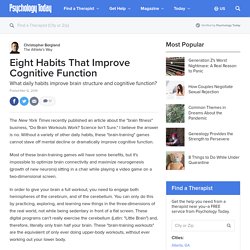

1) Take Care of Your Physical Health
2) Eat Healthy Foods
3) Be Physically Active
4) Keep Your Mind Active
5) Stay Connected with Social Activities
6) Reduce Risks to Cognitive Health. 1) Take care of your physical health. How to Promote Physical Health While Aging: The Healthy Aging Checklist Part 2 - Better Health While Aging. 2) Eat healthy food. The Top Brain Power Foods for Seniors. It’s no secret that a healthy diet contributes to a healthy body, but eating nutritious foods can also lower the risk of cognitive decline as we age.

A team of researchers recently found that elderly people who consumed the most nutritious food lowered their risk of cognitive decline by nearly 25 percent, compared to those with the least healthy diets. “It is likely that a healthy diet has effects on cardiovascular risk factors and cardiovascular disease, and that this is an important mechanism for reducing the risk of cognitive decline,” said the study’s lead author, Andrew Smyth, a researcher at the Population Health Research Institute at McMaster University in Ontario and the HRB Clinical Research Facility Galway at the National University of Ireland in Galway.
So what foods make up a healthy brain diet? Below is a list of the top brain power foods – in no particular order – that can improve mental health, especially for seniors who want to ward off cognitive decline. Salmon Walnuts Eggs. 3) Be physically active. Senior Exercise and Fitness Tips. No matter your age, it’s never too late to get fit.

These easy tips will help you get started safely and make it fun. What are the benefits of exercise for older adults? There are many reasons why we tend to slow down and become more sedentary with age. It may be due to health problems, weight or pain issues, or worries about falling. Or perhaps you think that exercising simply isn’t for you. A recent Swedish study found that physical activity was the number one contributor to longevity, adding extra years to your life—even if you don’t start exercising until your senior years.
Getting moving can help boost your energy, maintain your independence, protect your heart, and manage symptoms of illness or pain as well as your weight. Physical health benefits Helps you maintain or lose weight. Reduces the impact of illness and chronic disease. Enhances mobility, flexibility, and balance. Mental health benefits Improves sleep. Boosts mood and self-confidence. Does amazing things for the brain. 4) Keep your mind active. Keep Moving to Keep Brain Sharp in Old Age. WEDNESDAY, Jan. 16, 2019 (HealthDay News) -- Staying active in old age may help preserve your memory and thinking skills, a new study suggests.

In fact, older people who were physically active kept their minds sharp, even if their brains showed signs of lesions or other markers linked to Alzheimer's disease or other dementias, researchers found. "Physical activity may provide cognitive reserve" that helps preserve the brain even in the face of dementia, said lead researcher Dr. Aron Buchman. He's professor of neurology at Rush University Medical Center in Chicago. Lifestyle appears to play a major role in keeping the mind sharp as we age, he said.
"Together, these suggest that a more active lifestyle, including physical, cognitive and social activities, may help maintain cognition in older adults," Buchman said. 5) Stay connected with social activities. Best Social Activities for Seniors - Altura Learning. Although you may not enjoy getting older, there are several perks.

Now that your children are grown, and you’re no longer working, you finally have more time to do the things you’ve always wanted to do. For example, you could explore new hobbies. Unfortunately, some senior citizens do their hobbies, alone, failing to interact with others. As a result, they suffer from isolation, which can also affect both their physical health and mental well-being. Here are Five of the Best Social Activities for Seniors. 6) Reduce risks to cognitive health. Eight Habits That Improve Cognitive Function. The New York Times recently published an article about the "brain fitness" business, "Do Brain Workouts Work?

Science Isn’t Sure. " I believe the answer is no. Without a variety of other daily habits, these "brain-training" games cannot stave off mental decline or dramatically improve cognitive function. Most of these brain-training games will have some benefits, but it's impossible to optimize brain connectivity and maximize neurogenesis (growth of new neurons) sitting in a chair while playing a video game on a two-dimensional screen. In order to give your brain a full workout, you need to engage both hemispheres of the cerebrum, and of the cerebellum. Article continues after advertisement Although the cerebellum constitutes only 10 percent of the brain by volume, it houses over 50 percent of the brain's total neurons.
Brain-Training Games Increase Sedentary Screen Time I slightly disagree. 1. 2. 3. 4.